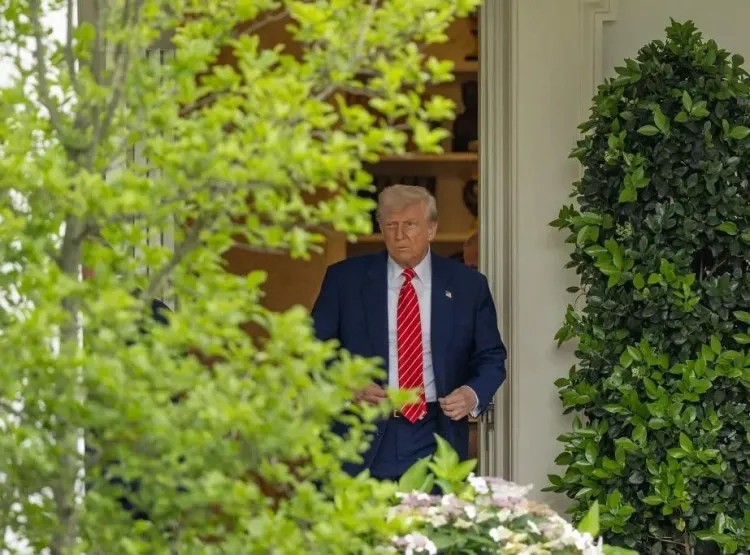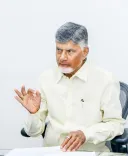The Third Eye: Is Analyzing Trump's Presidency a Challenge for Strategic Observers?

Synopsis
In a deep dive into President Trump's second term, we explore how his America First agenda shapes global dynamics. Is his focus on tariffs and isolationism undermining America's historical legacy? Join us as we dissect Trump's controversial policies and their impact on US diplomacy.
Key Takeaways
- Trump's 'America First' agenda raises concerns of isolationism.
- Criticism of tariff policies suggests a shift from statesmanship.
- Operation Sindoor showcases India's military readiness.
- Negotiations with Pakistan highlight the complexity of US-India ties.
- Trump's approach to terrorism aligns with India's security interests.
New Delhi: In his second term, US President Donald Trump is facing criticism on three fronts: his commitment to the 'America First' agenda is steering the US towards isolationism, his emphasis on tariffs is enhancing his reputation as a 'business leader' over that of a 'statesman', and his administration is increasingly associated with anti-liberalism, contradicting the historical American ethos.
Does President Trump possess the intellectual acumen that creates the impression of being unpredictable, arbitrary, and sometimes offensive, while underlying this behavior is a 'method to his madness'? He appears to be determined to correct governance, manage financial recklessness, and ensure that the world does not take the US for granted, as he aims to maintain its status as the premier superpower. He has astutely identified key global challenges that threaten American dominance, including Islamic terrorism, a determined China seeking economic supremacy, and the undue advantages that allied nations have historically leveraged against the US.
President Trump’s willingness to dedicate himself to transforming America is evident in his engagement with a remarkable range of international crises and negotiations spanning Europe, Asia, and the Middle East.
During his tenure, the White House is spearheading numerous vital diplomatic initiatives. He is actively involved in negotiations and has demonstrated a capacity for course correction when faced with roadblocks. This was evident when he claimed to have brokered a ceasefire between India and Pakistan amidst escalating military tensions following the terrorist incident in Pahalgam.
In his eagerness to claim credit for resolving geopolitical issues, he suggested mediating between India and Pakistan regarding the Kashmir dispute, but soon recognized that such a suggestion could jeopardize India-US relations, prompting him to advocate for direct dialogue between the two nations.
The Trump administration's interest in the India-Pakistan military standoff cannot be criticized, especially after Pakistan sought assistance following significant damage to its airbases due to India's military actions.
India's agreement to a ceasefire request from Pakistan at the DGMO level is not indicative of weakness. Operation Sindoor aimed at striking numerous terrorist bases inside Pakistan, and a subsequent failed drone attack by the Pakistani army led to a significant missile response from India, compelling Pakistan to seek a cessation of hostilities.
This response enhances India’s reputation as a responsible, peace-loving nation. The Modi government's assertion that Operation Sindoor was successful is also supported by the ensuing political debates at home, reflecting domestic political dynamics.
Trump's foreign policy approach appears flawed, as it does not adequately balance its components. The slogan 'Making America Great Again' (MAGA) relies on military and technological strength alongside economic power derived from trade, as well as on the interdependence that bolsters US strength. Trump's apparent focus on military might and economic power has overshadowed the importance of maintaining robust ties with democracies across Europe and Asia.
His inclination to withdraw from international organizations that advocate liberal values in favor of the 'America First' doctrine may yield short-term financial benefits but risks undermining US supremacy as the leader of the democratic world.
If Trump's actions were merely a series of immediate fixes aimed at correcting trade deficits and improving governance, it could be comprehensible. However, he must recognize that the long-term sustainability of MAGA fundamentally relies on global acceptance of the US as a bastion of human and democratic values, especially in contrast to the rise of authoritarian regimes.
Trump's handling of global hotspots, including the Middle East, where Israel's military actions in Gaza have raised humanitarian concerns, showcases his assertive and occasionally astute methods. His approach has been direct, emphasizing his personal involvement in diplomatic initiatives, reflecting a strong political will and commitment to advancing what he perceives as beneficial for America's economy.
His trips to traditional US allies in the Arab states, including Saudi Arabia, UAE, and Qatar, resulted in these nations committing trillions of dollars in investments in the US.
Trump also announced the lifting of sanctions on Syria, now under the governance of President Ahmad Al Sharra, which was met with celebrations in that region.
He continues to staunchly support Israel and has endorsed the latest Israeli strategy to maintain military presence in Gaza along its border. Trump previously suggested commercially developing Gaza as a tourist destination, indicating he still envisions economic benefits from establishing a stable area along the Israel-Palestine border.
The recent escalation involving a radicalized Hamas, which resulted in a brutal attack on October 7, 2023, claiming 1200 Israeli lives and resulting in the abduction of 250 individuals, has heightened tensions. Israel has the right to respond militarily to Hamas, which operates through underground tunnels in Gaza. However, the extensive civilian casualties, particularly among women and children, have raised serious ethical concerns.
Iran's support for Hamas has likely fueled Trump's animosity towards the nation. Nevertheless, he continues to press Iran to curb its nuclear ambitions while expressing a desire to resolve the Ukraine-Russia conflict.
The President deserves recognition for his steadfast commitment to advancing policies that he believes serve America's interests, actively steering diplomatic, economic, and governance strategies with determination and assurance.
India has navigated its relationship with the US during Trump's second term with astuteness, strategic foresight, and a strong belief that the natural friendship between the two largest democracies can contribute positively to the global landscape.
At the same time, India retains the prerogative to reject any actions that undermine mutually beneficial India-US relations or appear excessively unilateral for a healthy bilateral partnership.
Trump's reluctance to abandon traditional US support for Pakistan could stem from a desire to prevent Pakistan from drifting further towards China. The influence of the US can be observed in the substantial financial assistance granted to Pakistan by international organizations to stabilize its economy during a critical crisis.
Indian diplomacy should aim to ensure that Trump's trade interests in Pakistan do not hinder the strategic partnership with the US. India should leverage the fact that Trump remains firmly opposed to radical Islamic terrorism and advocate for a zero-tolerance approach towards terrorism, including cross-border terrorism directed from Pakistan into Kashmir.
(The writer is a former Director of the Intelligence Bureau)







